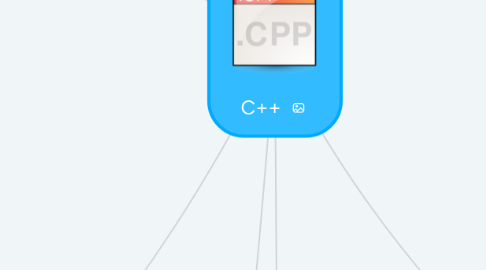
1. Pros
1.1. Portability
1.2. Object-oriented
1.3. Multi-paradigm
1.4. Low-level Manipulation
1.5. Large Community Support
1.6. Memory Management
1.7. Compatibility with C
1.8. Scalability
2. Cons
2.1. Use of Pointers
2.2. Security Issue
2.3. Absence of Garbage Collector
2.4. Absence of Built-in Thread
3. Applications
3.1. GUI Applications
3.2. Operating Systems
3.3. Web Browsers
3.4. Database Management System
3.5. Libraries
3.6. Cloud Computing and Distributed Applications
3.7. Job Opportunities
4. Basics
4.1. Syntax 'Components of the C++ Program'
4.1.1. Header Files
4.1.2. Namespace
4.1.3. The Main Function
4.1.4. Open And Close Tags ( ) { } [ ]
4.1.5. Print Statement
4.1.6. return 0;
4.1.7. Tokens in C++
4.1.8. Comments
4.1.9. Whitespaces in C++
4.1.10. Semicolons
4.2. Data Types
4.2.1. bool 'Boolean'
4.2.2. char 'Character'
4.2.3. int 'Integer'
4.2.4. float 'Fractional Number'
4.2.5. double 'Fractional Number'
4.2.6. void 'Valueless'
4.3. Flow Control
4.3.1. Control Statements
4.3.1.1. If Statements
4.3.1.2. If ..else Statements
4.3.1.3. switch Statements
4.3.2. Repetition Statements
4.3.2.1. For loop
4.3.2.2. While loop
4.3.2.3. Do..while loop
4.3.3. Continue
4.3.4. Break
4.4. Functions
4.4.1. Parts Of Function
4.4.1.1. Return Type
4.4.1.2. Function Name
4.4.1.3. Parameters
4.4.1.4. Function Body
4.4.2. Types Of Function
4.4.2.1. Function no arguments passed and no return value
4.4.2.2. Function no arguments passed but a return value
4.4.2.3. Function arguments passed but no return value
4.4.2.4. Function arguments passed and a return value
4.4.3. Storage Class
4.4.3.1. Local Variable
4.4.3.2. Global Variable
4.4.3.3. Static Local variable
4.5. Arrays
4.5.1. Declaration
4.5.2. Initialization
4.5.3. Concept & Description
4.5.3.1. Multi-dimensional arrays
4.5.3.2. Pointer to an array
4.5.3.3. Passing arrays to functions
4.5.3.4. Return array from functions
4.6. Structures
4.6.1. Defining a Structure
4.6.2. Accessing Structure Members
4.6.3. Structures as Function Arguments
4.6.4. Pointers to Structures
4.6.5. The typedef Keyword
5. Object Oriented
5.1. Classes and Objects
5.1.1. C++ Class Definitions
5.1.2. Define C++ Objects
5.1.3. Accessing the Data Members
5.1.4. Classes and Objects in Detail
5.2. Inheritance
5.2.1. Base and Derived Classes
5.2.2. Access Control and Inheritance
5.2.3. Type of Inheritance
5.2.3.1. Public Inheritance
5.2.3.2. Protected Inheritance
5.2.3.3. Private Inheritance
5.2.4. Multiple Inheritance
5.3. Overloading
5.3.1. Function Overloading in C++
5.3.2. Operators Overloading in C++
5.4. Polymorphism
5.4.1. Virtual Function
5.4.2. Pure Virtual Functions
5.5. Data Abstraction
5.5.1. Access Labels Enforce Abstraction
5.5.2. Benefits of Data Abstraction
5.5.3. Designing Strategy
5.6. Data Encapsulation
5.7. Interfaces
6. Features
6.1. Object-Oriented Programming
6.2. Simple
6.3. High-level programming language
6.4. Popular
6.5. Case sensitive
6.6. Compiler-Based
7. Advanced
7.1. Files and Streams
7.1.1. Opening a File
7.1.2. Closing a File
7.1.3. Writing to a File
7.1.4. Reading from a File
7.1.5. File Position Pointers
7.2. Exception Handling
7.2.1. Throwing Exceptions
7.2.2. Catching Exceptions
7.2.3. C++ Standard Exceptions
7.2.4. Define New Exceptions
7.3. Dynamic Memory
7.3.1. new and delete Operators
7.3.2. Dynamic Memory Allocation for Arrays
7.3.3. Dynamic Memory Allocation for Objects
7.4. Namespaces
7.4.1. Defining a Namespace
7.4.2. The using directive
7.4.3. Discontiguous Namespaces
7.4.4. Nested Namespaces
7.5. Templates
7.5.1. Function Template
7.5.2. Class Template
7.6. Preprocessor
7.6.1. The #define Preprocessor
7.6.2. Function-Like Macros
7.6.3. Conditional Compilation
7.6.4. The # and ## Operators
7.6.5. Predefined C++ Macros
7.7. Signal Handling
7.7.1. The signal() Function
7.7.2. The raise() Function
7.8. Multithreading
7.8.1. Creating Threads
7.8.2. Terminating Threads
7.8.3. Passing Arguments to Threads
7.8.4. Joining and Detaching Threads
7.9. Web Programming
7.9.1. What is CGI?
7.9.2. Web Browsing
7.9.3. CGI Architecture Diagram
7.9.4. Web Server Configuration
7.9.5. HTTP Header
7.9.6. CGI Environment Variables
7.9.7. C++ CGI Library
7.9.8. GET and POST Methods
7.9.9. Passing Information Using GET Method
7.9.10. Passing Information Using POST Method
7.9.11. Passing Checkbox Data to CGI Program
7.9.12. Passing Radio Button Data to CGI Program
7.9.13. Passing Text Area Data to CGI Program
7.9.14. Passing Drop down Box Data to CGI Program
7.9.15. Using Cookies in CGI
7.9.16. Setting up Cookies
7.9.17. Retrieving Cookies
8. Standard Library
8.1. C++ <cmath>
8.1.1. C++ cos()
8.1.2. C++ sin()
8.1.3. C++ tan()
8.2. C++ <cstdlib>
8.2.1. C++ strtod()
8.2.2. C++ atof()
8.2.3. C++ strtol()
8.3. C++ <iostream>
8.3.1. C++ cin
8.3.2. C++ cout
8.3.3. C++ cerr
8.4. C++ <cstring>
8.4.1. C++ memcpy()
8.4.2. C++ strcat()
8.4.3. C++ memmove()
8.5. C++ <cctype>
8.5.1. C++ isalpha()
8.5.2. C++ isblank()
8.5.3. C++ iscntrl()
8.6. C++ <csignal>
8.6.1. C++ signal()
8.6.2. C++ raise()
8.7. C++ <clocale>
8.7.1. C++ setlocale()
8.7.2. C++ setlocale()
8.8. C++ <cwctype>
8.8.1. C++ iswspace()
8.8.2. C++ iswgraph()
8.8.3. C++ iswupper()
8.9. C++ <cstdio>
8.9.1. C++ remove()
8.9.2. C++ rename()
8.9.3. C++ tmpfile()
8.10. C++ <cwchar>
8.10.1. C++ fwide()
8.10.2. C++ fgetwc()
8.10.3. C++ fgetws()
8.11. C++ <cuchar>
8.11.1. C++ c16rtomb()
8.11.2. C++ c32rtomb()
8.11.3. C++ mbrtoc16()
8.12. C++ <csetjmp>
8.12.1. C++ longjmp() and setjmp()
8.13. C++ <cfenv>
8.13.1. C++ feclearexcept()
8.13.2. C++ feraiseexcept()
8.13.3. C++ fegetexceptflag()
8.14. C++ <ctime>
8.14.1. C++ clock()
8.14.2. C++ difftime()
8.14.3. C++ time()
